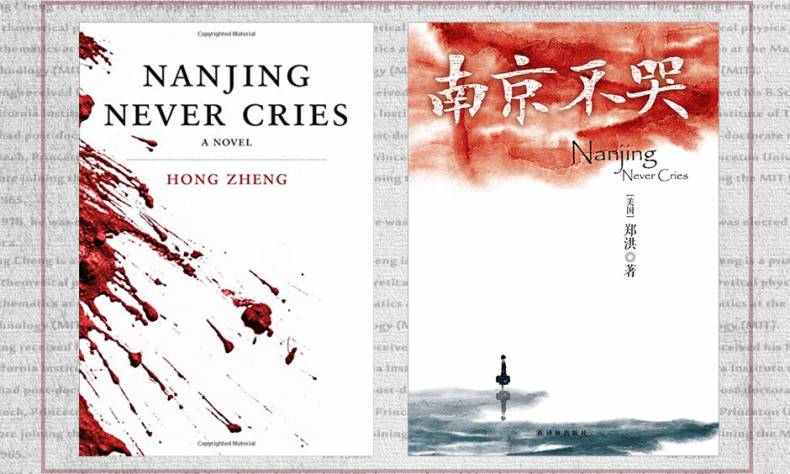
A Different Approach to Inform the World of the Full Horror of the Nanjing Massacre
The book takes a different approach to inform the world of the full horror of the Nanjing Massacre.
– Review: “Nanjing Never Cries” by Hong Zheng
By Andrew Spivey
In 1995, on the 60th year anniversary of the atomic bombing of Hiroshima, the Massachusetts Institute of Technology (MIT) convened a symposium to reflect on the incident, and consider America’s role and the resulting guilt it should or should not feel for its actions. One of those listening attentively in the audience was Hong Zheng, an applied mathematics professor at MIT.
Born in China in 1937, the year Japan launched its full-scale invasion of China, Zheng himself witnessed first-hand the harsh realities of the Japanese occupation, and grew up alongside stories of the aftermath of countless Japanese atrocities, which left an indelible mark on him.
Hence, whilst the panelists discussed at length America‘s guilt for inflicting suffering on the Japanese people in Hiroshima in 1945, their failure to even mention Japan’s violence against China or other Asia nations enraged Zheng, and prompted him to raise the issue and ask the panel if Japan too might feel and express remorse for its actions.
To his consternation Zheng found that the panelists were vague in their response, reflecting either a reluctance to address the matter, or a complete lack of awareness. The other attendees of the symposium also seemed unfamiliar with the hardships endured by the Chinese during the Japanese occupation from 1937-45. It was this episode that spurred Zheng to action and gave him the resolve to raise the profile of this war in the western consciousness.
Thus, after over a decade of perfecting his work, Zheng has finally published “Nanjing Never Cries”, a novel which tells the story of one of the most horrific events during the Japanese aggression, the Nanjing Massacre.
A Novel Approach to Documenting the Nanjing Massacre
The Nanjing Massacre has been covered at length before by other American authors.
In 1997 Iris Chang’s “The Rape of Nanjing: The Forgotten Holocaust of World War II” revealed to the west the killing, torture and rape that occurred during the atrocity.
Chang’s book was investigative in nature, concerned primarily with highlighting the full barbarity of the incident by uncovering and presenting new primary sources relating to the massacre, such as the diary of John Rabe.
From these sources Chang recounted the countless heinous crimes that were committed, and citing evidence claiming that the death toll may have been as high as 300,000.
In contrast to Chang‘s academic work, Zheng’s book “Nanjing Never Cries” takes a different approach to inform the world of the full horror of the Nanjing Massacre.
Zheng has decided to re-tell the incident through the eyes of its four central characters, who are intended to be representative of those who experienced Nanjing leading up to and during the massacre.
To ensure the characters were realistic, Zheng consulted with two survivors of the massacre and incorporated their accounts into his novel.
The personal stories of the four characters help the reader to relate the character’s lives with their own, thus helping the reader to empathize with their experiences, and making their tortuous ordeal even more poignant.
John Winthrop, Calvin Ren and their Tragedy
The range and diversity of the central characters, and also the inclusion of real life historical figures, ensures that “Nanjing Never Cries” succeeds in giving a variety of perspectives on the events.
The two male leads, John Winthrop and Calvin Ren, are both engineering graduates from MIT. Zheng presumably draws from his own experiences at the university to create their back-story, and their engineering skills are central to one of the main threads in the novel, a covert operation to build warplanes for the Chinese to adequately defend themselves against Japanese aggression.
The project is first initiated by the Chinese-born Calvin, who returns from America to his hometown in Nanjing as tensions between China and Japan escalate. Calvin is soon joined by John who, never having travelled to “the orient” before, is somewhat naive concerning the events unfolding there.
Yet after an encounter with Soong Mei-Ling, the wife of the President of the Republic of China, Chiang Kai-Shek, and also the Secretary General of the Aeronautical Affairs Commission, who implores him to assist on the warplane building project, John at once grasps the full extent of the imminent threat posed by the Japanese, and alongside Calvin becomes convinced that it is his duty to design and assemble the warplanes that China so evidently lacks.
They work tirelessly on building the warplanes, and they make a good team in doing so, with the exceptional theoretical mind of Calvin complemented by John’s capacity to transform concepts into reality.
Yet ultimately the endeavor is from the outset a hopeless cause, as becomes abundantly clear by the sheer superiority of the Japanese forces that invade Nanjing in December 1937.
China is overwhelmed and defenseless before the onslaught, and the failure of the warplane project reflects the wider tragedy of the incident – the weakness of the Chinese state at the time left them at the mercy of the Japanese forces that descended on Nanjing.
Zheng’s implied message here is that China must develop adequate defenses to protect itself in the present, to prevent a similar atrocity occurring again.
Judy and her Symbolic Misery of Many Asians in the West
The two other central characters are female. There is Judy, a Chinese-American who is married to Calvin and accompanies him to Nanjing, teaching English while he toils on the warplane project.
As a Chinese-American born in the early 20th century she was subject to the racist attitudes towards Asians in America of the time, including bullying throughout her childhood.
Her misery is symbolic of the experiences of many Asians in the west during the period, and this provides another point of reflection for the reader – perhaps this attitude acted to lessen the impact of the Nanjing Massacre on the western consciousness, as at the time the east was a distant, mysterious place little understood by the majority of the population.
To sum up, “Nanjing Never Cries” is a superbly written book, grounded in historical reality and deeply moving throughout. Moreover, the novel is often disturbing and tragic; for example, upon the invasion of Nanjing almost all of the supporting cast meet their demise at the hands of the Japanese.
The mass deaths of what were relatable supporting characters have even more impact because they are all acquaintances of the main characters, and thus their loss is felt by the reader also.
By utilizing an assortment of contemporary characters Zheng has made it easier for the reader to enter the shoes of the protagonists, truly understand their situation and, moreover, fully comprehend the gravity of the Nanjing Massacre, the extent of its horrors, and why it must never be repeated.
Thus by writing such an incredible book, Zheng has succeeded in preserving the memory of the massacre for posterity.
Nanjing Never Cries is recommended reading for anyone who wishes to gain an understanding of what it would be like to live through the Nanjing Massacre, and to learn more about such an important event in world history, that still has repercussions today.
Andrew Spivey is cnfocus’ columnist, and the article reflects the author’s opinion, and not necessarily the view of China Cnfocus.
 Facebook
Facebook
 Twitter
Twitter
 Linkedin
Linkedin
 Google +
Google +











